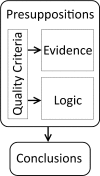Perspective: Fundamental Limitations of the Randomized Controlled Trial Method in Nutritional Research: The Example of Probiotics
- PMID: 30124741
- PMCID: PMC6140446
- DOI: 10.1093/advances/nmy046
Perspective: Fundamental Limitations of the Randomized Controlled Trial Method in Nutritional Research: The Example of Probiotics
Abstract
Studies on the relation between health and nutrition are often inconclusive. There are concerns about the validity of many research findings, and methods that can deliver high-quality evidence-such as the randomized controlled trial (RCT) method-have been embraced by nutritional researchers. Unfortunately, many nutritional RCTs also yield ambiguous results. It has been argued that RCTs are ill-suited for certain settings, including nutritional research. In this perspective, we investigate whether there are fundamental limitations of the RCT method in nutritional research. To this end, and to limit the scope, we use probiotic studies as an example. We use an epistemological approach and evaluate the presuppositions that underlie the RCT method. Three general presuppositions are identified and discussed. We evaluate whether these presuppositions can be considered true in probiotic RCTs, which appears not always to be the case. This perspective concludes by exploring several alternative study methods that may be considered for future probiotic or nutritional intervention trials.
Figures


Similar articles
-
The future of Cochrane Neonatal.Early Hum Dev. 2020 Nov;150:105191. doi: 10.1016/j.earlhumdev.2020.105191. Epub 2020 Sep 12. Early Hum Dev. 2020. PMID: 33036834
-
Nutritional interventions for preventing stunting in children (birth to 59 months) living in urban slums in low- and middle-income countries (LMIC).Cochrane Database Syst Rev. 2019 Jun 17;6(6):CD011695. doi: 10.1002/14651858.CD011695.pub2. Cochrane Database Syst Rev. 2019. PMID: 31204795 Free PMC article.
-
Randomized controlled trials and neurosurgery: the ideal fit or should alternative methodologies be considered?J Neurosurg. 2016 Feb;124(2):558-68. doi: 10.3171/2014.12.JNS142465. Epub 2015 Aug 28. J Neurosurg. 2016. PMID: 26315006 Review.
-
A literature review on the representativeness of randomized controlled trial samples and implications for the external validity of trial results.Trials. 2015 Nov 3;16:495. doi: 10.1186/s13063-015-1023-4. Trials. 2015. PMID: 26530985 Free PMC article.
-
Maternal probiotic supplementation for prevention of morbidity and mortality in preterm infants.Cochrane Database Syst Rev. 2018 Dec 12;12(12):CD012519. doi: 10.1002/14651858.CD012519.pub2. Cochrane Database Syst Rev. 2018. PMID: 30548483 Free PMC article.
Cited by
-
Multi-etiological Perspective on Child Obesity Prevention.Curr Nutr Rep. 2019 Jan 16:10.1007/s13668-019-0256-3. doi: 10.1007/s13668-019-0256-3. Online ahead of print. Curr Nutr Rep. 2019. PMID: 30649714 Free PMC article. Review.
-
Common Limitations and Challenges of Dietary Clinical Trials for Translation into Clinical Practices.Int J Endocrinol Metab. 2021 May 1;19(3):e108170. doi: 10.5812/ijem.108170. eCollection 2021 Jul. Int J Endocrinol Metab. 2021. PMID: 34567133 Free PMC article. Review.
-
Behavioral Research Agenda in a Multietiological Approach to Child Obesity Prevention.Child Obes. 2019 May/Jun;15(4):223-226. doi: 10.1089/chi.2019.0052. Epub 2019 Mar 29. Child Obes. 2019. PMID: 30925082 Free PMC article. No abstract available.
-
A 12-Week, Randomized, Double-Blind, Placebo-Controlled Study to Evaluate the Efficacy and Safety of Lactobacillus plantarum LMT1-48 on Body Fat Loss.Nutrients. 2025 Mar 28;17(7):1191. doi: 10.3390/nu17071191. Nutrients. 2025. PMID: 40218949 Free PMC article. Clinical Trial.
-
Dietary intervention in gestational diabetes: a qualitative study of the acceptability and feasibility of a novel whole-diet intervention in healthcare professionals.Br J Nutr. 2024 Jan 28;131(2):219-228. doi: 10.1017/S0007114523001666. Epub 2023 Aug 10. Br J Nutr. 2024. PMID: 37642175 Free PMC article.
References
-
- Young SS, Karr A. Deming, data and observational studies. Significance [Internet] 2011;8:116–20.
-
- Ioannidis JPA. Implausible results in human nutrition research. BMJ [Internet] 2013;347:f6698. - PubMed
-
- Blumberg J, Heaney RP, Huncharek M, Scholl T, Stampfer M, Vieth R, Weaver CM, Zeisel SH. Evidence-based criteria in the nutritional context. Nutr Rev [Internet] 2010;68:478–84. - PubMed
MeSH terms
LinkOut - more resources
Full Text Sources
Other Literature Sources

